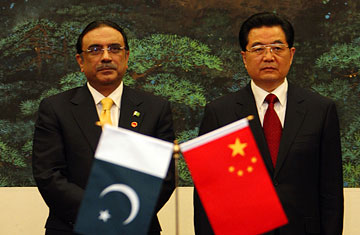
Chinese President Hu Jintao, right, and his Pakistani counterpart Asif Ali Zardari at a ceremony at the Great Hall of the People in Beijing on October 15, 2008
Washington is not the only ally calling on Islamabad to take action against militants based in its tribal areas along the Afghan border. Now, according to a prominent Pakistani politician, Beijing is calling on the Pakistani government to deal with militants based there and allegedly plotting attacks in China later this year.
In two separate meetings in the past two months, senior Chinese officials have warned President Asif Ali Zardari that the East Turkestan Islamic Movement (ETIM), a group with roots in Xinjiang province, has established its "military headquarters" in Pakistani territory. Xinjiang is China's largest province and the homeland of a large Muslim minority, the Uighur. Uighur separatists allegedly attacked Chinese transportation in the period leading up to the Beijing Olympics. (See a story about Pakistan cozying up to China.)
The details of the meetings were revealed by Chinese officials to Mushahid Hussain, a close ally of former President General Pervez Musharraf and the most visible supporter of Islamabad's alliance with Beijing, during recent meetings in central Asia. "They told me that the ETIM has its military headquarters in [Pakistan's tribal areas] and is planning to attack China on the 60th anniversary celebration of the communist revolution," says Hussain. The ETIM has been designated a terrorist organization by both the United States and China. (See a story about Pakistan's fraying relationship with China.)
The issue was first raised during Zardari's recent visit to China in February. The President was making his second trip in four months to what is considered Pakistan's principal ally in the region. He was visiting Hubei and Shanghai to observe China's progress in agriculture, hydroelectric power and the financial sector. There had been no plan to meet with the Chinese leadership. But according to Hussain, Meng Jianzhu, the Chinese Minister for Public Security flew from Beijing to discuss the ETIM threat. "The minister met with him for 90 minutes," says Hussain. Before leaving Shanghai, Zardari praised his country's alliance with China and told reporters: "We are not threatened by nations, but by non-state actors."
In March, Beijing followed up by dispatching a "special envoy" to Islamabad with the sole brief of discussing ETIM, according to Hussain. A spokesperson for Zardari denied knowledge of the meetings. "We know that China is extremely concerned about terrorism in the region, but we are unaware of any such meeting having taken place," the spokesman said. (See a story about China's "other" Tibet.)
The ETIM and other Chinese separatist militants have maintained a long but murky presence in Pakistan's tribal areas for a number of years. In 2003, Hasan Mahsoum, the group's founder, was killed by the Pakistan army. The Chinese government has claimed in the past that Mahsoum established links with Osama bin Laden as early as 1999. In 2005, the State Department described the group as being "linked to al-Qaeda and the international jihadist movement", and had been provided with "training and financial assistance" from al-Qaeda.
"The security threat from these groups is one of the top priorities for the Chinese government," says Yiyu Lu, a China expert at London's Royal Institute of International Affairs. "China has accused the ETIM of being a terrorist organization. It has asked the Shanghai Cooperation Organization to help it fight separatism and fundamentalism. There is a history of militants from Xinjiang going abroad, some were picked up in Afghanistan, others went to central Asia and Pakistan." Several ethnic Uighurs were held at the U.S. base in Guantanamo, Cuba; many have since been released or relocated.
